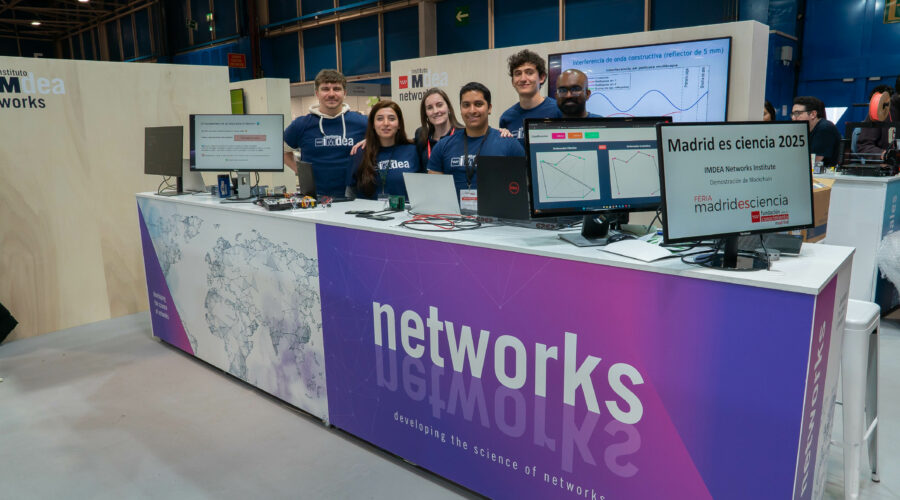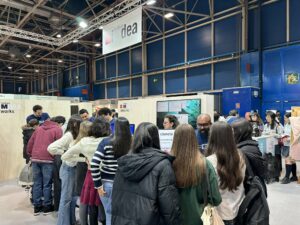IMDEA Networks

IMDEA Networks at the 14th Edition of the Madrid es Ciencia Fair
The public discovered how technology is transforming the world through educational games
31 March 2025

Thousands of people visited the IMDEA Networks stand at the Madrid es Ciencia Fair, held from March 27 to 29 at Pavilion 1 of IFEMA. The 14th edition of Madrid’s largest science outreach event, organized by Madrimasd, was a resounding success. Over three intense days, IMDEA Networks’ research team engaged students of all ages and the general public in interactive activities showcasing how we develop technology. The stand also received visits from the Regional Minister of Education, Science, and Universities, Emilio Viciana, and the Deputy Regional Minister of Universities, Research, and Science, Ana Ramírez.
Visitors had the opportunity to dynamically explore how binary and decimal number systems work through a demonstration by research engineer Anthony Sánchez and PhD student Serly Moghadas, experimenting with the well-known 7-segment displays. They also explored electromagnetic wave phenomena using a cutting-edge radar system.
Another highlight was the demonstration by PhD student Orlando Martínez, who showed how computers perceive the world through a game where participants could control rockets with their heads and another featuring facial recognition. Meanwhile, Anthony Sánchez tested visitors’ visual skills with an image processing game based on color detection.
David de Andrés explained how Dijkstra’s algorithm works to find the shortest path in a network, using the example of a connection between a Netflix content server and a television. Additionally, Alexandr Goultiaev challenged attendees with a natural language AI experiment, where they wrote words they considered similar to see how AI would relate them.
 Research engineer Josué Aguilar amazed participants with an experiment demonstrating that it is possible to “listen to light,” transmitting data wirelessly using just an LED lamp and a mini solar panel. Meanwhile, younger attendees had fun with a quantum computing game designed by Nicolás Borrajo, where they had to connect different points following the shortest path and compete against a quantum computer.
Research engineer Josué Aguilar amazed participants with an experiment demonstrating that it is possible to “listen to light,” transmitting data wirelessly using just an LED lamp and a mini solar panel. Meanwhile, younger attendees had fun with a quantum computing game designed by Nicolás Borrajo, where they had to connect different points following the shortest path and compete against a quantum computer.
The stand also featured an educational demonstration on blockchain, led by predoctoral researcher Arivarasan Karmegam. In addition, senior researcher José Aguilar demonstrated how machine learning can be used to assess the democratic quality of different countries.
To wrap up the experience, postdoctoral researcher Livia Chatzieleftheriou organized a Kahoot quiz aimed at inspiring the next generation and celebrating the contributions of women in science and technology.
Over the course of three days, attendees enjoyed the best of science in service of society, testing their ingenuity in various challenges and receiving prizes for their achievements. They also had the chance to complete their IMDEA passport, getting it stamped at each institute they visited and earning the title of specialists in our research. It was an immersive experience where participants not only learned but were also recognized for their curiosity and enthusiasm.


Recent Comments